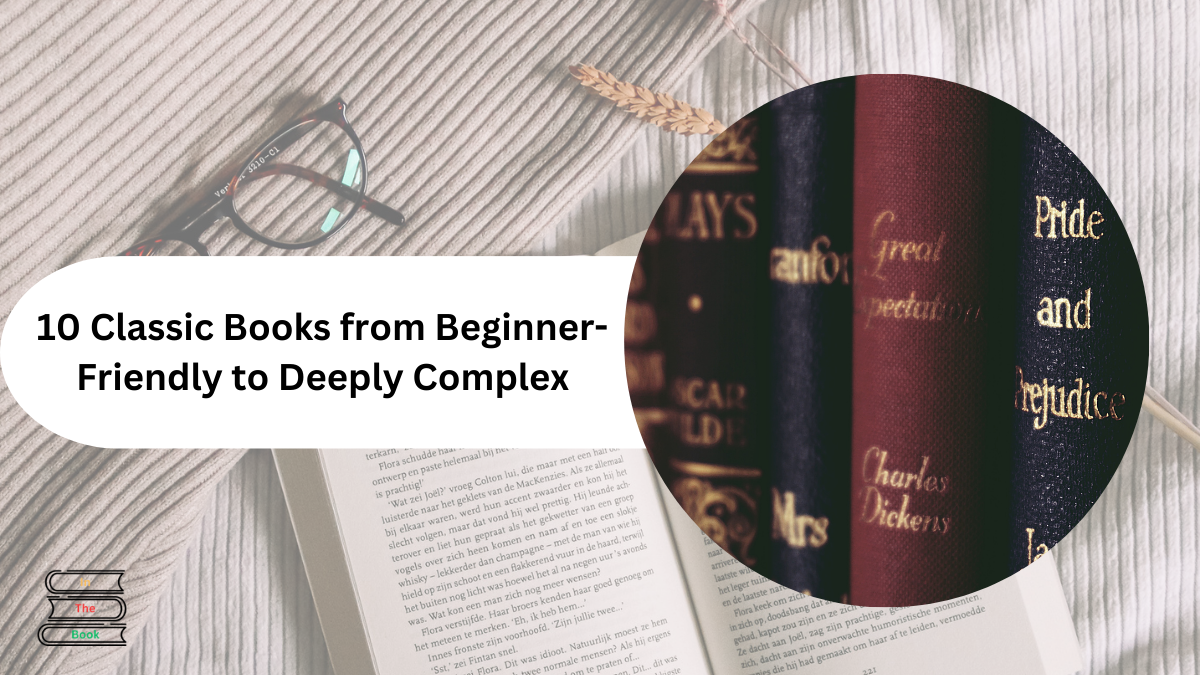Classic literature often inspires both admiration and intimidation. While some novels offer an engaging and easy-to-follow experience, others can be daunting. Whether you’re a seasoned reader or just beginning to explore literary classics, it helps to know which books are more approachable and require more effort.

Contents
- Ten Classic Books
- 1. The Great Gatsby by F. Scott Fitzgerald
- 2. Pride and Prejudice by Jane Austen
- 3. To Kill a Mockingbird by Harper Lee
- 4. Of Mice and Men by John Steinbeck
- 5. Frankenstein by Mary Shelley
- 6. The Picture of Dorian Gray by Oscar Wilde
- 7. Jane Eyre by Charlotte Brontë
- 8. Moby-Dick by Herman Melville
- 9. Wuthering Heights by Emily Brontë
- 10. Ulysses by James Joyce
- Conclusion: A Journey Through Classic Literature
Ten Classic Books
Here, we rank ten classic novels, starting with the easiest and progressing to the most difficult, helping you navigate your journey into the world of timeless literature.
1. The Great Gatsby by F. Scott Fitzgerald
Set during the Jazz Age, The Great Gatsby captures the glamour, excess, and tragedy of the 1920s through the story of Jay Gatsby and his unrequited love for Daisy Buchanan. Fitzgerald’s elegant prose and vivid descriptions make this a relatively short and accessible read, perfect for those new to classic literature. The novel’s exploration of love, wealth, and disillusionment resonates across generations, offering readers a richly layered yet easy-to-understand story.
2. Pride and Prejudice by Jane Austen
Pride and Prejudice is a witty and insightful examination of marriage, manners, and social status in 19th-century England. Following Elizabeth Bennet and her complex relationship with Mr Darcy, the novel blends humour, romance, and sharp social commentary. Austen’s engaging writing style and sharp dialogue make this an enjoyable classic that is easy to read yet filled with timeless insights into human nature and society.
3. To Kill a Mockingbird by Harper Lee
Set in the racially divided South of the 1930s, To Kill a Mockingbird tells the story of Scout Finch and her father, Atticus, a lawyer defending a Black man accused of raping a white woman. The novel tackles issues of justice, morality, and empathy through Scout’s innocent perspective. Lee’s straightforward prose and compelling narrative make this Pulitzer Prize-winning novel accessible and impactful.
4. Of Mice and Men by John Steinbeck
Of Mice and Men is a novella about the friendship between two itinerant workers, George and Lennie, during the Great Depression. Steinbeck’s simple and accessible language makes it easy to read, but the story’s emotional depth, dealing with themes of loneliness, dreams, and loss, leaves a lasting impact. This short but powerful tale is a classic that resonates deeply with readers.
5. Frankenstein by Mary Shelley
Often hailed as the first science fiction novel, Frankenstein tells the story of Victor Frankenstein and the creature he creates. The novel is written in an epistolary format and explores themes of ambition, isolation, and the dangers of unchecked scientific curiosity. While the language can occasionally be dense, Shelley’s suspenseful plot keeps readers engaged, making it an accessible yet thought-provoking read.
6. The Picture of Dorian Gray by Oscar Wilde
This gothic novel follows Dorian Gray, a man whose portrait ages while he remains young and beautiful, symbolizing the moral decay of his soul. Wilde’s witty and provocative writing, combined with the novel’s exploration of vanity, corruption, and art, makes it captivating. Though the language can sometimes be ornate, the engaging plot and memorable quotes make this novel an excellent entry point into more complex classics.
7. Jane Eyre by Charlotte Brontë
Jane Eyre is a richly textured novel that blends romance, mystery, and social critique. It follows the life of Jane Eyre, from her difficult childhood to her stormy romance with the enigmatic Mr. Rochester. While Brontë’s writing is evocative and engaging, the novel’s rich language and detailed narrative demand careful attention. Its love, independence, and morality exploration makes it a rewarding read.
8. Moby-Dick by Herman Melville
Often considered one of the greatest American novels, Moby-Dick tells the story of Captain Ahab’s obsessive quest to kill the white whale. Narrated by Ishmael, the novel delves into themes of obsession, revenge, and humanity’s struggle against nature. Melville’s complex prose, symbolism, and philosophical musings make it a challenging read, but the novel’s deep exploration of human nature and fate offers a rich literary experience.
9. Wuthering Heights by Emily Brontë
Wuthering Heights is a dark, passionate tale of Heathcliff and Catherine Earnshaw, whose destructive love haunts the Yorkshire moors. Brontë’s intricate narrative structure, shifting timelines, and changing perspectives make this novel complex, requiring careful reading. Despite its difficulty, the novel’s intense emotions, gothic atmosphere, and themes of love, vengeance, and redemption make it an enriching read.
10. Ulysses by James Joyce
Considered one of the most challenging novels ever written, Ulysses chronicles a single day in the life of Leopold Bloom in Dublin. Joyce’s innovative narrative techniques, stream-of-consciousness writing, and dense allusions to classical literature make this a difficult read, even for seasoned readers. Despite its complexity, the novel offers profound insights into human consciousness and language, making it one of the most celebrated works in modern literature.
Conclusion: A Journey Through Classic Literature
From more effortless, more engaging reads to complex literary masterpieces, classic novels offer a range of experiences that cater to different levels of readers. Whether starting with an accessible story or ready to tackle a more challenging book, each of these classics provides unique insights into human nature, society, and history. Enjoy the journey and discover the timeless stories that continue to captivate readers worldwide.

Ross, an exam specialist with a passion for education, writes comprehensive articles on exam results and admit cards. His expertise ensures students receive reliable information and useful tips to excel in their exams.


























